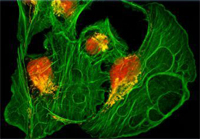What is fraught with pancreatic cancer? Who is in the risk group? Answers to these and some other questions about pancreatic cancer can be found in this article.
Content
Diseases of the human digestive system. Every year in the world
About 220 thousand is registered. new cases of this disease, of which
about 213 thousand. End in fatal exodus. Pancreatic cancer
glands - extremely aggressive disease with severe complications.
What is the pancreas and what is its role in the body? Pancreas is one of the largest glands of the external secretion of our body and the main body that produces enzymes necessary for digestion. The pancreas of an adult has an oblong, flat shape and is located behind the stomach («under the stomach»), the mass of the gland reaches 150-200 g. From above, the pancreas is covered with a dense shell of connective tissue, and inside consists of a variety of microscopic glands opening in the tubules.
In the pancreas there are two main types of cells:
- Excree cells produce digestive enzymes (an indispensable component of the digestive juice, providing food cleavage for composite elements). The most common shape of the pancreatic cancer is adenocardcinoma, originating from exocrine pancreatic cells.
- Endocrine cells producing two hormones - insulin and glucagon. Pancreatic hormones are involved in the regulation of glucose levels in the blood (insulin reduces, and glucagon increases blood glucose concentration).
Risk factors for the development of pancreatic cancer
Pancreatic cancer is a rather common tumor. The incidence of this oncological pathology is about 8-30 cases per 100 thousand population. On the scale of the whole country, the number of patients with various malignant pancreatic tumors can reach impressive values. For example, in Russia every year about 13 thousand new cases of pancreatic cancer are revealed.
Pancreatic cancer is sick, mostly elderly people 60-80 years. Very rarely (one case out of ten) this disease is striking people younger than 50 years.
The incidence of pancreatic cancer among men is higher than among women (in some countries - almost 2 times).
To date, a certain cause of pancreatic cancer (as well as most other malignant tumors) is not established. Different studies in this area, with a greater or less probability, indicate the following risk factors for the development of pancreatic cancer:
-
 Hereditary factors play a particularly important role in the development of pancreatic cancer in young people. Probably, in these cases, the early development of this type of tumor is associated with mutation in certain genes.
Hereditary factors play a particularly important role in the development of pancreatic cancer in young people. Probably, in these cases, the early development of this type of tumor is associated with mutation in certain genes.
- Sugar diabetes was noted as a risk factor for the development of pancreatic cancer in many studies. According to modern ideas, the risk of developing pancreatic cancer is higher in patients with an insulin-dependent form of diabetes, the diseases of this disease after 40 years.
- Smoking is one of the most common factors predisposing to the development of malignant pancreatic tumors. In one of the studies it was shown that smokers have the risk of developing pancreatic cancer almost 2 times superior to the non-smoking.
- It is assumed that poisonous substances contained in tobacco smoke act on the pancreas through blood and through bile (through the intestines). It is also shown that after the refusal of smoking, the risk of rack of the pancreas gradually decreases and after 15 years compared with the risk of this disease in non-smokers.
- Incorrect food, especially excessive consumption of oily food, can also increase the risk of developing pancreatic cancer.
Food rich in vitamins (especially vitamins E and C) can be used as the prevention of this type of cancer. It was also proved that there are particularly citrus, containing a natural cancer gene inhibitor.
Pancreatic cancer is very dangerous. The survival statistics of patients with this kind of cancer is very sad: mortality is practically equal equal to the incidence. The reason for the high percentage of mortality is that, in first, the disease occurs hard and with many complications, and secondly, the majority of patients appeals to the doctor too late when the tumor has already formed metastases in the internal organs.
The pancreatic cancer itself is a rather aggressive tumor, which is distinguished by the rapid growth and early formation of metastasis, but the danger of pancreatic cancer is connected with another - the special properties of the pancreas and enzymes produced by it.
The enzymes produced by the pancreas are very aggressive and able to breed any biological substrate, so in the pancreatic tubules (before contact with food) they are stored in inactive condition. With various diseases, in the number and in the pancreatic cancer, these enzymes can occur, which begin to digest the gland itself and the surrounding fabrics and organs. That is why all inflammatory (acute pancreatitis) and tumor processes (cancer) of the pancreas proceed very hard. In particularly severe cases, enzymes fall into the blood and spread throughout the body, causing a shock state of the patient, very difficult to treat. Operations on the pancreas, for the same reasons are associated with great risk.









